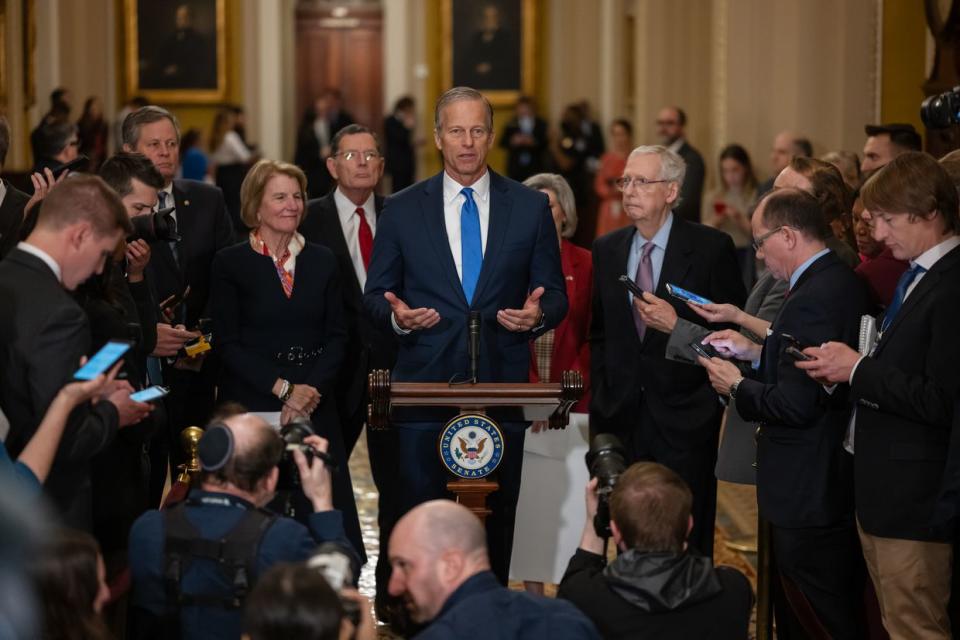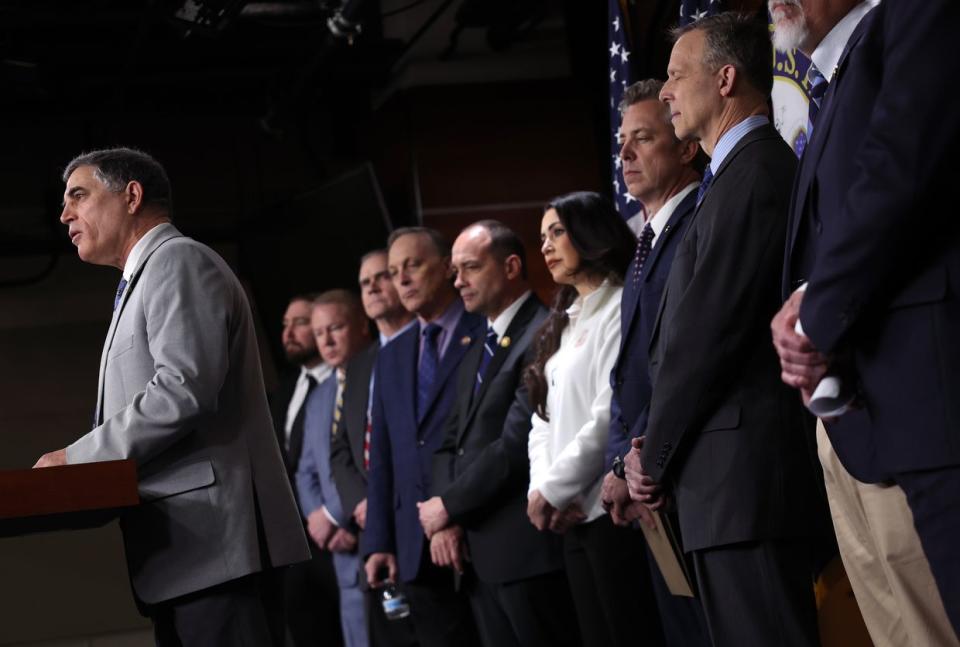Why some far-right Republicans are hell bent on ending further aid to Ukraine
- Oops!Something went wrong.Please try again later.
As the world watched in horror at Russia’s unprovoked full-scale invasion and war against Ukraine in the early months of 2022, Americans rallied firmly behind the embattled eastern European democracy.
Shortly after the start of the full-scale war, 79% of U.S. voters supported sending arms to Ukraine, and 78% supported sending financial aid, according to polling by Ipsos conducted in March 2022.
Two years of grueling fighting later, U.S. support for Ukraine has dropped significantly, but a majority of Americans – 58% – still want their country to send weapons and money to Ukraine to aid it in its war effort.
However, dig into the numbers some more and some troubling trends emerge – and they run along political lines:
While support among Democrats for arming Ukraine has dropped from 83% to 75% in two years, among Republicans it has plunged from 80% in March 2022 to just 45% in February 2024.

Vocal opposition to continued assistance is rising on the right wing of the U.S. political spectrum. Reflecting broader political dynamics unfolding within the U.S. and around the world, a politics of right-wing populism skeptical of Ukraine aid has become increasingly influential among the U.S. Republican Party and its supporters.
Once home to the most aggressive of foreign policy hawks, key members of a populist wing of the Republican Party are now leading a charge to end further aid to Ukraine, despite an authoritarian Russia continuing its attacks.
Under the banner of “America First,” and emboldened by the chance of former U.S. President Donald Trump returning to office, these figures are calling into question the durability of U.S. President Joe Biden’s commitment to support Ukraine “for as long as it takes.”
Challenges to aid
After allocating $74 billion worth of aid to Ukraine since February 2022, the next package of aid worth $60 billion has stalled in Congress.
Republican Speaker of the House Mike Johnson has so far refused to bring the package to a vote amid ongoing partisan negotiations, although he recently announced Congress would hold a vote on aid for Ukraine following the end of the Easter holiday on April 7.
Meanwhile, some Republicans have pushed for aid in the form of loans.


This stalling of aid comes as Russian forces utilize numerical advantages in soldiers and critical munitions to claw their way forward along sections of the front. Meanwhile, with Ukraine’s stocks of air defense missiles thought to be dwindling, deadly Russian missile and drone strikes on Ukrainian cities have recently been on the increase.
As Ukraine’s defense is largely reliant on Western-supplied equipment, Kyiv’s supporters in the U.S. – like Doug Klain, a policy analyst at the Ukrainian NGO Razom and a non-resident fellow at the Atlantic Council’s Eurasia Center – have been attempting to convince Republicans to drop their opposition.
“Earlier today I had a meeting with a Republican member of Congress from the Deep South, and their office told us pretty plainly, ‘Look, our constituents, to put it lightly, are deeply misinformed about Ukraine, and are exposed to this kind of warped media environment where they hear that Ukraine is filled with Nazis, hopelessly corrupt, and isn't deserving of support,’” Klain told the Kyiv Independent.
Republican voters’ sentiment on Ukraine may not always align with their representatives in Congress, who are often managing competing pressures.
“Even though that's (what) the constituency of this Republican member of Congress (believes), his staff still said unambiguously that ‘we support Ukraine, we know it's the right thing to do, and sometimes we just have to signal (that) to our constituents,’” Klain said.
This shift in views among Republican voters has coincided with a growing proliferation of narratives from influential figures on the right that are skeptical of, or plain opposed to assisting Ukraine. Their narratives range from critique to disinformation.
Within Congress, a small minority of Republican representatives have voted to oppose aiding Ukraine at every opportunity. They include Representatives Andy Biggs, Dan Bishop, Warren Davidson, Matt Gaetz, Paul Gosar, Marjorie Taylor Greene, Thomas Massie, Ralph Norman, Scott Perry, and Thomas Tiffany.
These members, with the exception of Thomas Massie and Marjorie Taylor Greene, are all members of the Freedom Caucus, a grouping of 43 Republicans that represent the extreme right of the House of Representatives. Greene is a former member who was expelled after a dispute with Rep. Lauren Boebert, another opponent of assisting Ukraine. Almost all are strong supporters of Trump.

According to a Congressional report card issued by the advocacy organization Republicans for Ukraine, roughly half of the current 219 Republicans in the GOP-controlled House of Representatives have a C or lower ranking, with 81 scoring an F for their opposition to aiding Ukraine.
Opposition to Ukraine is also more concentrated among Republicans who supported Trump’s attempt to overturn the 2020 election: Of the 147 Republican members of Congress who voted against certifying the 2020 election, 139 were members of the House of Representatives and eight were in the Senate.
Of the 139 representatives, only 44 have an A or B rating on the GOP Congressional Report Card. Of the rest, 73 have a C or lower rating, with 56 scoring an F. Three others have since died, 17 were voted out of office, and two former representatives are now senators.
The two senators, Ted Budd of North Carolina and Markwayne Mullin of Oklahoma, were among the 26 Republican senators to vote against the latest attempt to pass Ukraine aid.
Trump and rightwing populism
“Right now the fight over Ukraine is a fight for the soul of the Republican Party, and that soul has been corrupted by Donald Trump,” John Conway, director of strategy at Republicans for Ukraine, told the Kyiv Independent.
“(Trump has) unleashed a wave of isolationism within the party, with his ‘America First’ agenda that has not only taken hold within voters, but within the MAGA (Make America Great Again, a Trump slogan) ecosystem, where the stars of this universe – like Steve Bannon, JD Vance, and Tucker Carlson – have really latched onto ‘America First’ and pumped this into the minds of traditional Republican voters.”


Despite two impeachments and a recent string of court rulings ordering the payment of more than $500 million in legal penalties, former U.S. President Trump has secured the Republican nomination for the 2024 presidential election, easily defeating Nikki Haley, his closest contender in the primary elections.
Haley has been a vocal supporter of aiding Ukraine and has rejected Trump’s false narrative that he won the 2020 election.
Her loss is reflective of a growing divide between a nationalist, populist right associated with Trump, and an establishment conservatism represented by figures such as Mitt Romney, John McCain, and Ronald Reagan – all proponents of the euphemistically termed “rules-based international order.”
This order, largely built in the aftermath of the Second World War through a system of treaties and international organizations operating on the alleged basis of international law, is increasingly challenged by a strengthening China and revanchist Russia, under its President Vladimir Putin.
These authoritarians often utilize the rhetoric of “multi-polarity” – which can echo 19th-century imperialist notions of “spheres of influence” and “might makes right.”
When it comes to Ukraine, some conservative critics frame their opposition to aid as a strategy for addressing the ostensible rise of “multi-polarity,” reflecting a perspective that seems closer to the positions of China and Russia than the Reagan Republicans of years past.
For instance, Representative Matt Gaetz, who has consistently endorsed Trump’s false narrative regarding the 2020 election, introduced the “Ukraine Fatigue” Resolution in early 2023 in an attempt to cut off all assistance to Ukraine, arguing that “America is in a state of managed decline, and it will exacerbate if we continue to hemorrhage taxpayer dollars toward a foreign war.”


And Ohio Senator JD Vance, a leading figure among the populist right that has earned praise from the influential right-wing think tank the Heritage Foundation, has consistently opposed aid to Ukraine.
On the eve of the full-scale invasion, Vance famously told former Trump advisor and self-described “Leninist” Steve Bannon, “I gotta be honest with you, I don’t really care what happens to Ukraine one way or another.”
Since then, Vance has argued that managing the southern border of the U.S. should be the highest priority while echoing white nationalist claims that Democrats are attempting to bring in immigrants to counter Republican voters – a common theme among the far right.
In December, Trump stated at a rally that “immigrants are poisoning the blood of our country,” while Ukraine aid opponent Chip Roy, a representative from Texas, described the Biden administration's immigration policies as “a purposeful effort to dilute our society, and to undermine our way of life – to destroy Western civilization.”
Illiberal growth
Messaging that ties aid to Ukraine with addressing issues closer to home can resonate with segments of the population that are already expressing deep disaffection with establishment politics.
Wealth inequality remains a defining feature of life in the U.S., with the top 10% wealthiest households controlling 66.6% of all wealth and the bottom 50% of households controlling only 2.6%, according to Federal Reserve data.
Nearly 40% of households earn less than $50,000 per year. Credit card, student, and medical debt remain persistent burdens for much of the population.


This reality creates fertile ground for populist challenges to the status quo, opening up space for an increasingly “illiberal” style of politics that challenges the legitimacy of dominant institutions and media.
“Here in this country, we only have two parties,” John Feffer, the director of progressive international affairs think tank Foreign Policy in Focus, and an expert on rightwing movements, told the Kyiv Independent.
“So great is the rage against these two main parties that have collaborated in the impoverishment of so many in so little time, that it seems as if the checks and balances of a liberal system, a liberal democracy, are not functioning effectively, are not getting things done,” Feffer said.
This disillusionment leads some to support illiberal “strongmen” politics, such as those of Trump, as a vehicle to overcome perceived stasis, according to Feffer.
He articulates the thinking of some on the right wing:
“So now we need to have a strong executive, that is unconstrained, unhampered by a feeble legislative branch, and certainly should not be constrained by a judicial branch. We need a judicial branch that basically just rubber stamps the executive's decisions, and we need someone who says he's going to be dictator on the first day, wink, wink, nudge, nudge.”
Trump recently told supporters he would be a dictator for one day only, where he would act to close the border entirely.
However, the Heritage Foundation recently outlined more sweeping objectives for a future Trump administration in Project 2025. They include pushing for a greater concentration of power within the presidency through the application of “unitary executive theory.”
In addition to arguing against aiding Ukraine, the influential think tank also admires Hungarian Prime Minister Viktor Orban, who has led efforts to block aid to Ukraine within the European Union, opposed sanctions on Russia, and delayed Sweden’s ascension to NATO.
Despite widespread criticism of his undemocratic practices, Orban has become a darling of the U.S. right wing for his outspoken opposition to LGBTQ rights, immigration, and “globalism.”
He maintains close ties with Trump and is considered Putin’s closest ally within the EU. In 2014, Orban coined the term “illiberal democracy.”

After recently meeting with Trump, Orban alleged that Trump’s plan to end the war in Ukraine involved withholding aid to Ukraine, thereby forcing a settlement that will almost certainly favor Putin. Exchanging land for “peace” is also a position Senator Vance has argued for while omitting to acknowledge the violence of Russian occupation.
If Trump wins the U.S. presidency next November and carries out his purported plan to kill off all aid to Kyiv, the lookout for Ukraine is grim. However, even now, with sentiment in the U.S. already shifting, the defenders of Ukraine in Washington have their work cut out for them.
“If we don’t change what we're doing right now, Ukraine will not be set up for success,” warned Klain.
“Going forward, we have to change course, and American policymakers especially need to understand that – and they need to act with urgency.”
Read also: Opinion: Orban is plain wrong on Ukraine
We’ve been working hard to bring you independent, locally-sourced news from Ukraine. Consider supporting the Kyiv Independent.

